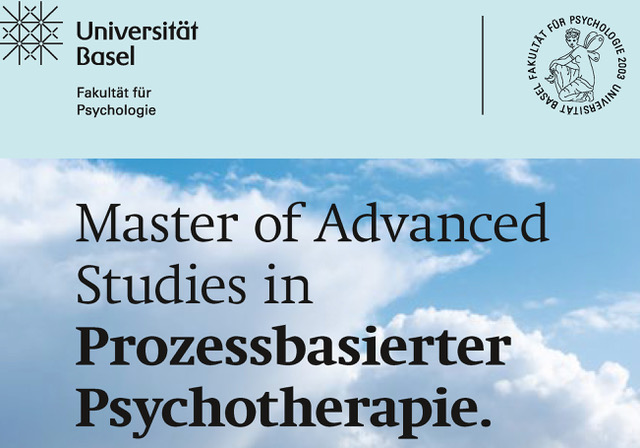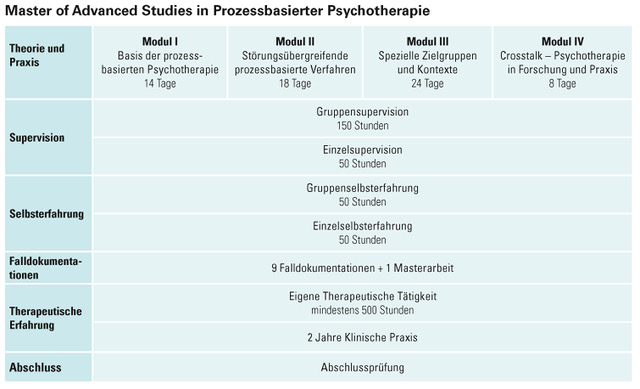Register now for the study program at the University of Basel


Have you ever wondered if there is a psychotherapy that integrates the best interventions from different schools of psychotherapy, applies them in a context- and situation-specific way, and is scientifically validated to be effective? Then perhaps process-based psychotherapy might just be something for you.
What is “process-based psychotherapy”?
Process-based psychotherapy addresses the question of how to initiate and support change processes in a context-specific manner using evidence-based interventions to help clients achieve lasting resolution of mental health problems, reduce symptoms and disorders, and improve quality of life and functioning. The therapeutic conversation and the therapeutic relationship serve as the foundation for promoting and supporting change processes in an evidence-based, moment-to-moment manner.
Process-based psychotherapy is the further development of disorder- or method-specific approaches, focusing on the mechanisms of action of clinically-relevant changes from research and practice. Accordingly, attention is directed to the psychological processes that promote flexibility in human behaviour across the board.
What exactly helps this person in their life context to achieve and maintain change?
In the therapeutic process, this is to be worked out, clarified, and implemented emotionally, cognitively, reflectively, motivationally, and behaviorally in contact with the clients, also taking into account physiological, social, cultural and societal conditions. Process-based psychotherapy thus involves a conceptual paradigm shift towards the central psychological mechanisms and processing that influence the behaviour and experience of clients both within and outside of psychotherapy.
So, what exactly do you learn in “process-based psychotherapy”?
First, we learn the theoretical and conceptual background of process-based psychotherapy, as well as the scientific foundations that are central to the therapeutic stance and approach. This includes, for example, behavioral analysis or psychiatric diagnostics but also practical matters such as dealing with digital possibilities, insurance issues and administration.
In the second part, effective strategies, and interventions for influencing basic and central processes of human experience and behavior are taught, which can be applied across disorders and problems. Process-relevant interventions from cognitive behavioral therapy (CBT), acceptance and commitment therapy (ACT), mindfulness-based therapy (MBT), compassion-focused therapy (CFT), and others are taught and practiced.
Further, we will learn specific contexts of applicability based on different populations: Psychotherapy across the lifespan (children, adolescents, adults, aging) and in different settings (individual, couple, family, group) and with different minorities (migration, LGBTQIA*). Somatic influencing factors (e.g., addictive substances, food, exercise) and the importance of critical life events (e.g., adaptation processes after serious illness, loss, separation, death, unfulfilled childbearing, job loss, and others) on mental health will also be included.
The program is complemented on one hand by workshops, which take place regularly and parallel to the modules. These workshops offer topics from research and clinical practice and are taught in the form of lectures and group work. On the other hand, the participants’ own clinical work, supervision and self-experience are, of course, a central part of the advanced studies.

Interested? Register now!
The Master of Advanced Studies in Process-Based Psychotherapy is aimed at psychologists with a master’s degree in psychology or physicians with a state examination/master’s degree in human medicine who are seeking a federally recognized specialist title in psychotherapy. You’ll find more info at the website of the University of Basel or you can directly register for online information events via Google Forms. The registration window for 2023 is open as of now.

